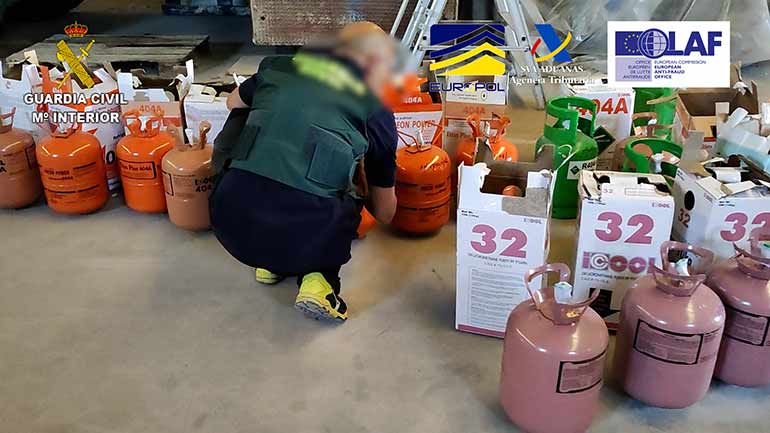110 tonnes of refrigerant seized in gang bust
28th June 2022
SPAIN: Twenty-seven people have been arrested and 110 tonnes of refrigerant seized in an operation which has seen the dismantling of a major criminal organisation in Spain.
In addition to the refrigerant, €364,000 in cash, several high-end vehicles, a large amount of documentation and computer equipment, 600 air conditioners, 435 grams of cocaine, 435 ecstasy tablets, material for cutting narcotic substances, a precision scale, a press and other effects used for drug trafficking were seized.

The operation, nicknamed Marum, was carried out jointly by the Spanish Civil Guard, the Tax Agency, Europol and the EU fraud agency OLAF. Twenty house searches were carried out, 10 companies inspected and arrests made in the provinces of Granada, Valencia, Albacete, Madrid, Toledo, Murcia, Seville, Almería, Jaén, Córdoba and Badajoz.
In total, 27 people were arrested, including the leaders of the network, and three investigated, for the alleged crimes of belonging to a criminal organisation, smuggling, against the public treasury and social security, money laundering, and crimes against the environment, public health and the rights of workers.
The investigations began in September 2021, when SEPRONA, the environmental division of Spain’s civil guard, was able to verify that refrigerant imported from China was being clandestinely sold in different locations in Granada at a price three times below the legitimate market value.

As a result of these investigations, an organised crime network was uncovered: the gas importer based in Valencia, a network of distributors whose two leaders had their base of operations in Granada and a secondary distribution network spread throughout Andalusia and other Spanish provinces.
The gas importer was using the T1 transit process, which allows a company based in the EU to import refrigerant from non-community countries destined for a third country outside the EU, without being subject to tariffs or taxes. In addition to normal import duties, Spain also levies a tax on all F-gases.
In this way, tonnes of gas were introduced into Spain through the port of Valencia, and would supposedly travel through several EU countries to their final destination in a third country such as Jordan, but, in fact, the shipment remained in Spain.
A ghost company was created in Portugal that was supposedly the recipient of the shipment, and which gave the appearance of legality to the gas transports if they were inspected by the authorities.
The detainees laundered the money obtained through a ghost company created for that purpose, or by buying high-end vehicles or real estate; but above all they did it through a Madrid travel agency, whose managers have also been arrested, where customers paid for the refrigerant as vacation packages or hotel services.







